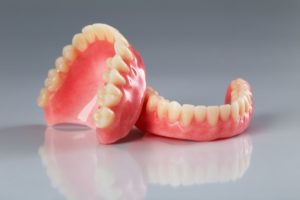
Eating and speaking are especially challenging if you have missing teeth, and dentures are a popular solution for addressing this. Not only do they help you perform daily tasks, but they do it while simultaneously restoring the appearance of your smile!
Though they come with many benefits, it’s frustrating when your dentures come loose. Lower dentures are often particularly troublesome. Keep reading to learn more about what might be causing them to become dislodged and what you can do about it.
What Factors Impact How Dentures Fit?
There are several factors that determine whether or not your dentures fit well, including:
- Border length. The sides (borders) of your dentures must be the correct length to create a close fit on your gums. This is what forms a strong seal for the suction that helps it to stay in place.
- Jawbone mass: When a tooth is lost, the jawbone around where the roots used to be begins to diminish due to lack of stimulation. This gradually changes the shape of your gum ridge. Since your dentures are custom-made to fit precisely over your gums, they will lose their fit as the shape of your mouth naturally changes.
- Alignment. If your dentures have become warped or aren’t aligning anymore, then they can’t suction the way they need to for proper placement.
Though these things can impact both upper and lower dentures, there are some unique challenges for the latter!
Why Does the Lower Denture Loosen?
It seems like there shouldn’t be a difference in how your top dentures fit versus your lower ones. After all, they’re basically the same equipment on the top as on the bottom, right?
The truth is that there are anatomical differences in the upper and lower jaws that affect how well dentures fit. For example, the lower denture needs to leave space for the up-and-down movement of your tongue against the floor of your mouth. It also needs to be designed to avoid becoming dislodged by the cheek side gums. That means it’s far more likely that your lower dentures will loosen instead of the upper.
What Can I Do to Keep Them In Place?
There are a few methods you can try that might help you keep that pesky lower denture where it’s supposed to be, such as:
- Practice. Specifically with the lower dentures, you’ll have to relearn how to speak and eat with them in place. It can be challenging to work your mouth muscles in ways you never had before. With time and patience, you’ll figure out how to function without accidentally displacing your denture.
- Adhesives. There are denture adhesives available, but keep in mind not to overuse them. A few small dots placed along the inside of your denture should be sufficient.
- Visit your dentist. If you find that your lower denture is still slipping, it’s time to make an appointment! Your dentist might need to check what state they’re in. They have the tools necessary to make any adjustments or repairs needed.
It can be irritating, and even embarrassing, to be in the middle of a meal or conversation and have your lower denture slip out of place! By addressing some of these points, you and your dentist can ensure that you move forward feeling confident that your smile will stick!
About the Author
Dr. Julia Karpman graduated from the University of Connecticut School of Dental Medicine, followed by a year-long residency at Danbury Hospital. She has expertise in restorative dentistry, periodontics, prosthodontics, implant dentistry, endodontics, and pediatric dentistry. She prides herself on providing patients with smiles that stay for years to come and can help make sure your dentures are fitting exactly as they should. If you’d like to make an appointment you are welcome to request one on the website or call (860) 563-3766.
